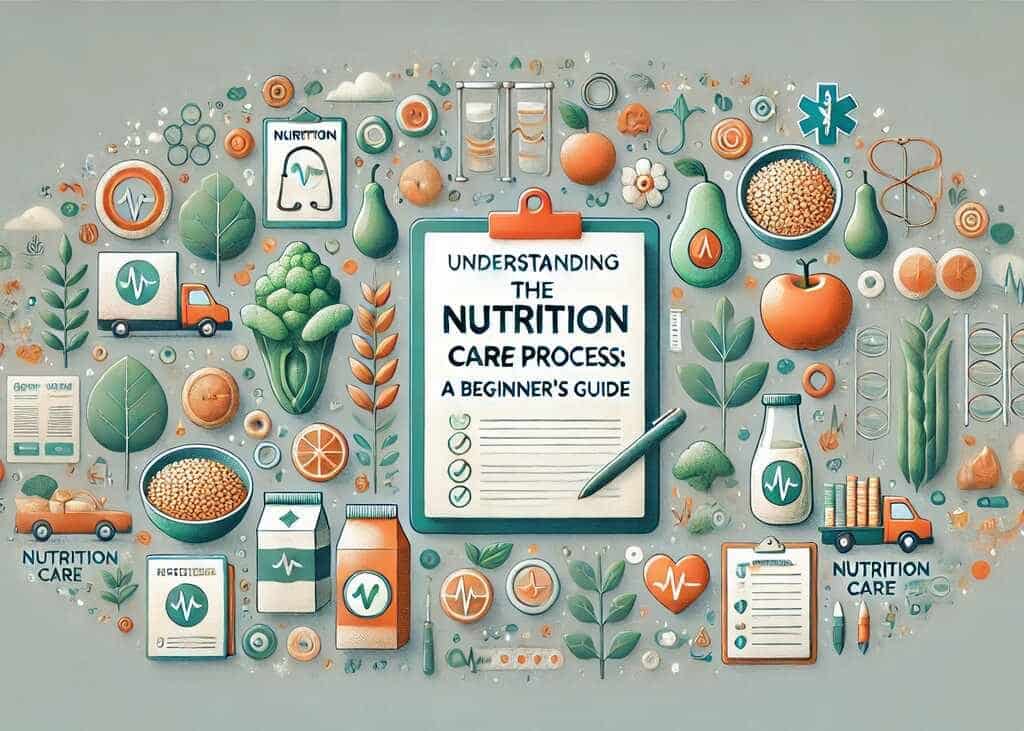The Nutrition Care Process (NCP) is a structured approach that nutrition experts use to build personalized meal plans that truly work. It’s far from guesswork—this roadmap helps dietitians create a diet and lifestyle plan tailored to your unique needs. Let’s dive into what the Nutrition Care Process involves, why it’s essential, and how it can make a real difference in your journey to wellness.
What is the Nutrition Care Process?
The Nutrition Care Process (NCP) is a structured, science-based approach to providing personalized nutrition care. It’s divided into four steps: assessment, diagnosis, intervention, and monitoring/evaluation. Each step focuses on creating a targeted plan based on your health needs, dietary habits, and lifestyle.

Why is the Nutrition Care Process Important?
The Nutrition Care Process helps dietitians create a tailored nutrition plan that isn’t about guesswork but about delivering personalized, evidence-based guidance. The process takes a holistic view of your health, accounting for everything from your medical history to your personal goals, and uses data to guide dietary recommendations. This ensures that each step along your journey is based on real, measurable insights.
Without this structured process, nutrition guidance could feel arbitrary or overwhelming. But with NCP, dietitians have a clear path to follow, allowing them to build plans that not only fit your lifestyle but also evolve with your health.
A Closer Look at the Four Steps of the Nutrition Care Process
Each step of the NCP works as a building block, supporting the next phase and providing a comprehensive approach to nutrition care.
1. Assessment: Getting a Full Picture of Your Health
The first step in the Nutrition Care Process is all about gathering information. The assessment phase allows dietitians to get a complete view of your health, dietary habits, and lifestyle factors. This goes beyond a simple food diary; it includes a review of your medical history, laboratory results, lifestyle, stress levels, and even social factors that might impact your eating habits.
For example, a dietitian may ask questions like:
- What are your typical eating habits?
- Do you have specific food preferences or restrictions?
- Are there health conditions you’re managing, like diabetes or hypertension?
- How often do you exercise, and what type of physical activity do you do?
Using these details, dietitians can pinpoint your exact nutritional needs. This in-depth assessment is crucial because it sets the foundation for the entire Nutrition Care Process, ensuring every recommendation that follows is relevant and personalized.
2. Diagnosis: Pinpointing Nutritional Issues
After gathering data during the assessment, the next step is diagnosis. Here, dietitians identify specific nutritional problems, known as “nutrition diagnoses.” These could include issues like “inadequate fiber intake” or “excessive sugar consumption.” Nutrition diagnoses aren’t medical diagnoses but rather focus on dietary issues that can be improved through targeted intervention.
For example, if you’re struggling with fatigue, a diagnosis might reveal that it’s linked to low iron or inadequate protein intake. Alternatively, if you’re working on weight management, a diagnosis might highlight a high intake of processed foods or low physical activity.
By focusing on these nutrition diagnoses, the dietitian can determine the most effective areas to target in your nutrition plan. This approach creates a roadmap for addressing specific health goals, from boosting energy levels to improving heart health.
3. Intervention: Creating a Personalized Action Plan
Once the diagnosis is complete, it’s time to move into the intervention phase. This is where the dietitian crafts an action plan tailored to your needs. Intervention might include creating meal plans, recommending specific nutrients, or suggesting lifestyle adjustments to help you achieve your health goals.
For instance:
- If you’re diagnosed with low fiber intake: The intervention might include adding fiber-rich foods like vegetables, whole grains, and legumes.
- If your goal is weight management: The dietitian may create a low-calorie meal plan with nutrient-dense foods to support sustainable weight loss.
- For fatigue management: They may suggest iron-rich foods and recommend timing meals to keep energy levels steady throughout the day.
The intervention step translates knowledge into action, creating tangible steps you can incorporate into your life. The plan is designed to be flexible and realistic, allowing you to make small, meaningful changes that add up over time.
4. Monitoring and Evaluation: Tracking Progress and Adjusting as Needed
The final step is monitoring and evaluation, where dietitians track your progress and make adjustments as needed. During this phase, your dietitian will review how well the interventions are working, make necessary tweaks, and address any challenges you face. Monitoring ensures that your nutrition plan remains effective and continues to evolve with your needs.
For example, you might meet with your dietitian periodically to discuss:
- Changes in energy levels or mood
- Success with sticking to the meal plan
- Any new health challenges or concerns
This ongoing evaluation makes the Nutrition Care Process dynamic, allowing the plan to adapt as you progress, ensuring that it stays aligned with your goals.
How the Nutrition Care Process Supports Long-Term Health
One of the greatest advantages of the Nutrition Care Process is its adaptability and focus on long-term results. Rather than a temporary diet, the NCP creates a sustainable path to better health by focusing on gradual, evidence-backed improvements. Let’s explore some of the key benefits:
Personalized to Your Unique Needs
The NCP is all about personalization. Since everyone’s health needs vary, this process ensures that dietary recommendations are tailored to your unique profile. For example, if you have dietary restrictions or specific preferences, the NCP accounts for those, creating a plan that’s realistic for your lifestyle.
Supporting Lasting Change
The step-by-step structure of the NCP is designed to help you build healthy habits that last. Instead of making drastic changes, the process encourages incremental adjustments that are easier to sustain. This approach leads to gradual progress and long-term benefits, like improved energy, better digestion, and weight management.
Enhancing Health Outcomes Through Continuous Improvement
Since the NCP includes monitoring and evaluation, dietitians can ensure the plan remains effective. By adjusting recommendations based on your progress, the process supports ongoing health improvements and provides a foundation for lifelong wellness.
For more insights on simple changes that support a healthier lifestyle, check out our article on health best practices to improve lifestyle.
How to Find a Nutrition Care Specialist
If you’re interested in working with a nutrition care specialist, here are some tips to help you find the right professional:
1. Seek Registered Dietitians or Licensed Nutritionists
Start by looking for registered dietitians (RDs) or licensed nutritionists with specialized training. These professionals have completed rigorous programs in nutrition science and are qualified to guide you through the Nutrition Care Process. Websites like EatRight.org offer directories of registered dietitians.
2. Ask for Recommendations
If you know friends, family members, or healthcare providers who’ve worked with a nutrition professional, ask for recommendations. Personal referrals are valuable, as they often come from firsthand experiences.
3. Check Their Areas of Expertise
Many dietitians specialize in areas like diabetes management, sports nutrition, or weight loss. Choosing someone with relevant experience ensures that you’ll receive guidance tailored to your specific health goals.
4. Evaluate Communication Style and Flexibility
Look for a nutrition care specialist who communicates clearly and is open to answering questions. This is especially important since you’ll discuss personal health details and work closely together to achieve your goals.
Success Stories with the Nutrition Care Process
Real-life success stories provide inspiration and illustrate the effectiveness of the Nutrition Care Process. For instance, clients have successfully managed conditions like diabetes, hypertension, and obesity by working with dietitians through the NCP. These personalized plans helped them improve health markers like blood sugar, blood pressure, and cholesterol levels.
One example includes a client with type 2 diabetes who, through targeted interventions, was able to improve blood glucose control and reduce medication dependency. Another client aiming for weight loss managed to sustain a healthy weight by following a low-calorie meal plan created through the NCP, which also included strategies for staying active and managing stress.
Additional Resources for the Nutrition Care Process
For more information on the Nutrition Care Process and finding a dietitian, here are some helpful links:
- Academy of Nutrition and Dietetics: Offers directories for finding registered dietitians and nutrition resources.
- National Institutes of Health (NIH) – Nutrition Research: Provides insights into the latest research on nutrition science and dietary interventions.
- CDC Nutrition Resources: Offers educational materials on various nutrition topics.
Why the NCP Works for You
Unlike generic diet plans, the NCP provides a structured, individualized approach that considers your lifestyle, medical history, and health goals. By working with a dietitian through the NCP, you’re setting yourself up for a sustainable approach to wellness that adapts as your needs change.

In a world filled with fad diets, the Nutrition Care Process offers a reliable, science-based approach to building a healthier life. From setting specific goals to tracking progress and adjusting the plan as needed, the NCP ensures that every part of your journey is based on sound guidance and genuine support.
Final Thoughts
The Nutrition Care Process transforms the way we think about nutrition and health. It goes beyond just “eating healthier” by creating a tailored, strategic plan that supports your unique path. With a clear structure, professional support, and continuous evaluation, the NCP empowers you to make lasting changes that impact your overall health and well-being.
Whether you’re aiming for more energy, better digestion, or weight management, the NCP provides a comprehensive, sustainable solution. As you work with a nutrition care specialist, you’ll gain the knowledge and confidence to make choices that truly benefit your health. The Nutrition Care Process is more than a plan—it’s a pathway to a healthier, happier life.

